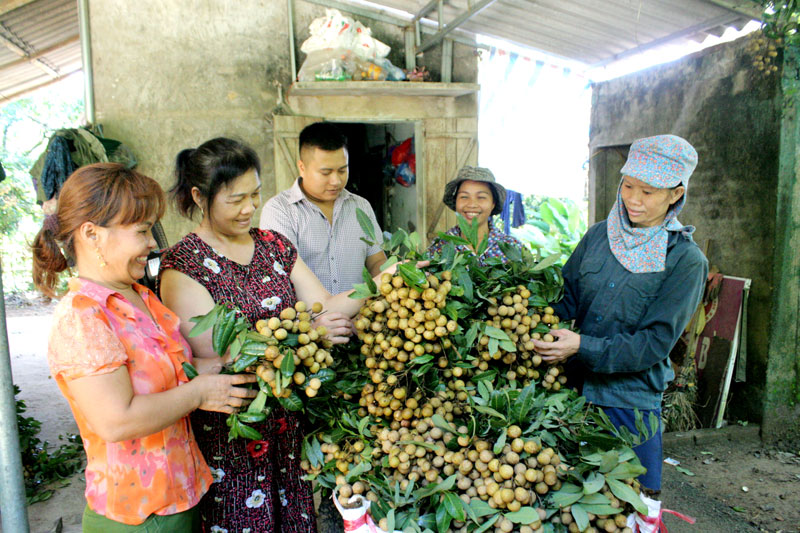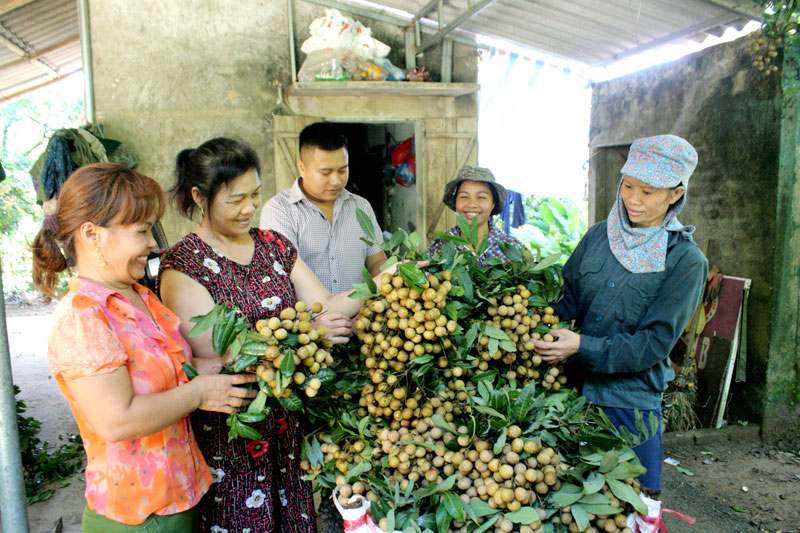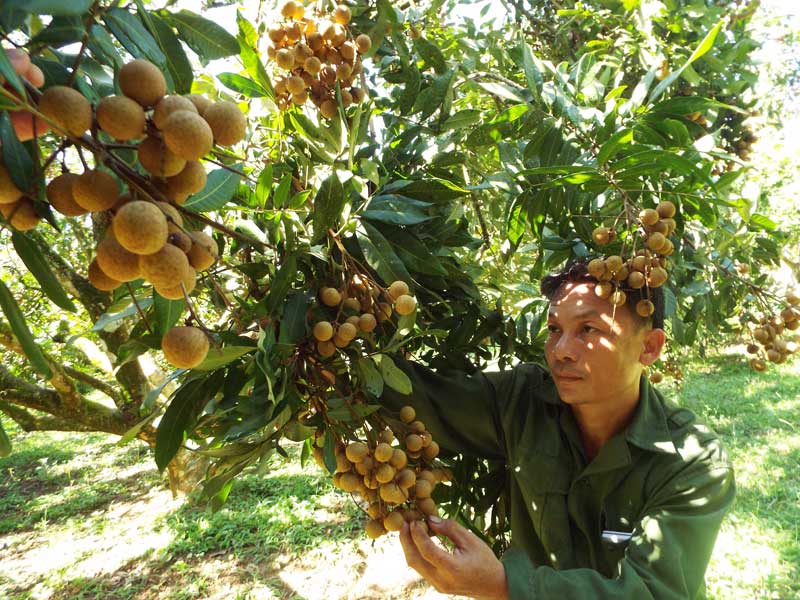
(HBO) – Son Thuy commune of Kim Boi district has enjoyed a bumper longan crop for another year. It is entering a new longan harvest season. Farmers are joyfully reaping longan while buyers from other provinces are also flocking to Son Thuy to purchase the fruit.

Residents
in Khoang hamlet are happy with the bumper crop and healthy price of Son Thuy
longan
Pham Van Phuong and his wife Bui Thi Dao are
busily preparing to sell longan to a buyer from Hai Phong city. Dao said her
family has planted longan for almost 20 years and now has about 230 longan
trees on one hectare of land. Longan was sold at 33,000 VND (1.45 USD) per kg
at the beginning of the harvest season and 25,000 VND (1.1 USD) per kg at
present. She estimated this crop’s output at about 25-30 tonnes, generating 600
million VND (26,400 USD) in revenue.
The family of Bui Van Men in Khoang hamlet, who
boasts 2 hectares of longan, is also busy with harvesting the fruit to sell to
traders from Hanoi. He expected an output of 30-35 tonnes and gained about 700
million VND (30,800 USD) in revenue if the average price is around 20,000 VND
(0.88 USD) per kg.
The soil in Son Thuy is favourable for longan.
The trees planted here is the Huong Chi variety hailing from Hung Yen province.
This variety, used to be offered to kings in the past, suits the climate and
soil conditions in Son Thuy and has become a specialty with big fruit, thin
skin, thick flesh and soft sweetness.
The farming techniques of farmers, especially
members of the local cooperative, have been improved, thus boosting longan
productivity. Longan is the most profitable plant that has ever been grown in
the commune since it can generate 400-500 million VND (17,600-22,000 USD) per
hectare, comparable to grapefruit and organge farming while longan is easy to
be cultivated and has only a few diseases. The brand of Son Thuy longan has
become popular among buyers in many places.

The family of Bui Van Men in Khoang hamlet
earns about 700 million VND from longan this year.
Secretary of the Son Thuy
communal Party Committee Bui Van Luc, one of the pioneers in cultivating the
Huong Chi longan variety, currently owns more than 2ha of longan, including
0.9ha of newly planted trees and 1.3 ha of 15-year trees. They produce 30
tonnes of longan this year which, with a price of 22,000 VND per kg, can earn
him over 600 million VND.
Luc said the commune is changing the cultivation
structure towards more longan and citrus trees. Among over 140ha of the
commune’s rice area, about 50ha have been shifted to longan farming, bringing
about considerable benefits. There are 110ha of longan across Son Thuy, and
58ha can be harvested at present. All of the five hamlets in the commune have
farmed longan with Khoang and Loc hamlets having the largest areas. Son Thuy
residents now consider their land as gold and are applying themselves to longan
farming. While the productivity in many major longan hubs such as Hung Yen
province or Dai Thanh commune of Hanoi’s Quoc Oai district is low, Son Thuy
recorded a bumper longan crop. The total output is estimated at 700 tonnes,
creating about 14 billion VND (616,000 USD) in revenue. The number of
households earning hundreds of millions of VND each year is not small at
present.
Since Son Thuy longan was recognised as a
collective brand, it has become more popular among customers. Buyers from not
only Hanoi, Phu Tho and Nghe An provinces but also Hai Duong province, Hai
Phong city and other localities have come to the commune to purchase longan.
Longan is giving life-changing opportunities to people in Son Thuy.
The commune is instructing local farmers to
comply with food safety and hygiene regulations, protect the collective brand
and shift the cultivation structure in a sustainable and effective manner.
According to data from the Hoa Binh Provincial Party Committee, the industrial production index for the first six months of 2025 is estimated to have increased by 20% compared to the same period last year. This marks the highest year-on-year growth rate for this period since 2020.
In the first six months of 2025, Hoa Binh province’s export turnover was estimated at 1.145 billion USD, marking an 18.11% increase compared to the same period in 2024. Import turnover was estimated at $ 804 million, a 17.15% increase, which helped the province maintain a positive trade balance.
The lives of the ethnic minority farmers in Tan Lac district have gradually improved thanks to the new directions in agricultural production. This is a testament to the collective strength fostered through the professional associations and groups implemented by various levels of the district’s Farmers’ Union.
With the motto the "product quality comes first,” after nearly one year of establishment and operation, Muong village’s Clean Food Agricultural and Commercial Cooperative, located in Cau Hamlet, Hung Son Commune (Kim Boi district), has launched reputable, high-quality agricultural products to the market that are well-received by consumers. The products such as Muong village’s pork sausage, salt-cured chicken, and salt-cured pork hocks have gradually carved out a place in the market and they are on the path to obtaining the OCOP certification.
In the past, the phrase "bumper harvest, rock-bottom prices" was a familiar refrain for Vietnamese farmers engaged in fragmented, small-scale agriculture. But today, a new spirit is emerging across rural areas of Hoa Binh province - one of collaboration, organisation, and collective economic models that provide a stable foundation for production.
Maintaining growing area codes and packing facility codes in accordance with regulations is a mandatory requirement for agricultural products to be eligible for export. Recently, the Department of Agriculture and Environment of Hoa Binh province has intensified technical supervision of designated farming areas and packing facilities to safeguard the "green passport" that enables its products to access international markets.




